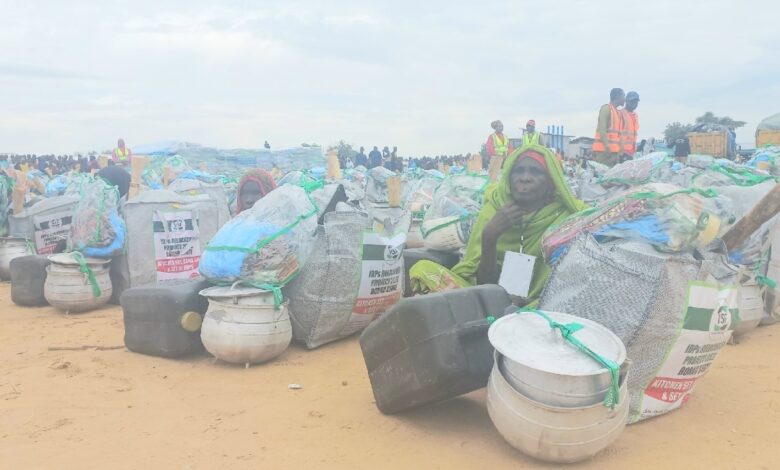Nigerian Authorities Push Ahead With Displaced Persons Camps Closure In Maiduguri
Borno state government gets over one billion naira support for relocating 66,000 displaced persons to their Local Government Areas.

The government of Nigeria’s northeastern state of Borno, on Thursday, July 28, flagged off the last phase of relocating internally displaced persons (IDPs) and closing the remaining official camps in Maiduguri, the state capital.
The displaced persons in the camps such as, Bolori-1, Bolori-2 and Gubio, would be resettled to Abadam, Bama, Damboa, Kala Balge, Konduga, Kukawa, Mafa, Marte, Mobbar, Monguno and Ngala Local Government Areas.
“Everything that has a beginning must have an end, and we hope this is an end to our years of suffering. We don’t know what is out there for us going home, but we still believe it would be better than the life we all had here,” said Yagana Adamu, a 55 years old grandmother from Bama.
The state Governor, Babagana Zulum, disclosed that the country’s Victims’ Support Fund approved the amount from the initial request of N3.2 billion to complete the relocation of displaced persons and closure of the 16 official camps in the capital.
In this phase, authorities would be resettling an estimated 66,000 displaced persons (11,000 households) in their local government areas. HumAngle had earlier reported the closure of camps and relocations to rehabilitated communities.
Executive Secretary of the Victim Support Fund, Nana Tanko, revealed that about 55 per cent of the N1.6 billion released would be managed by a Microfinance Bank responsible for disbursing the fund in two phases. The other half of the fund was used to purchase foods and non-food items to ease the resettlement.
According to the Zulum, closing the camps in Maiduguri was necessary because there were growing cases of prostitution, procreation without care and child abuse in the camps; such life in the IDP camps is no longer sustainable.
The closure of camps which started in December 2020, stopped midway due to a lack of funds to facilitate the relocations.
The process has also been marred with safety concerns and challenges in accessing livelihood due to security threats and restrictions.
Support Our Journalism
There are millions of ordinary people affected by conflict in Africa whose stories are missing in the mainstream media. HumAngle is determined to tell those challenging and under-reported stories, hoping that the people impacted by these conflicts will find the safety and security they deserve.
To ensure that we continue to provide public service coverage, we have a small favour to ask you. We want you to be part of our journalistic endeavour by contributing a token to us.
Your donation will further promote a robust, free, and independent media.
Donate HereStay Closer To The Stories That Matter




